Online MBA Courses in India
Online MBA courses in India offer a flexible and convenient way for professionals to advance their education and career prospects without the need to attend traditional campus-based classes.

Here are some key aspects and options for pursuing an online MBA in India:
Eligibility Criteria and Admission
Generally, candidates need a bachelor’s degree with a minimum percentage (usually around 50%) from a recognized university. Many programs also require work experience and scores from entrance exams like the CAT, CMAT, or the university’s own tests.
Top Universities and Institutes:

- IGNOU (Indira Gandhi National Open University): Known for its flexibility and wide range of specializations.
- St. Andrews Institute of Technology and Management, Gurgaon – St. Andrews offers a MBA course that is designed to integrate management education with professional skill development. The fee for the BBA course is approximately INR 1.5 lakh per annum.
Specializations
In India, online Business Administration MBA courses encompass traditional disciplines such as Finance, Marketing, Human Resources, and Operations Management, alongside newer areas like Data Analytics, Digital Marketing, and Healthcare Management.
Course Duration and Structure
Most online MBA courses are designed to be completed in 2 years, but some can be extended to suit a student’s schedule. The curriculum typically includes core courses, electives, and a capstone project.
Interactive Platforms
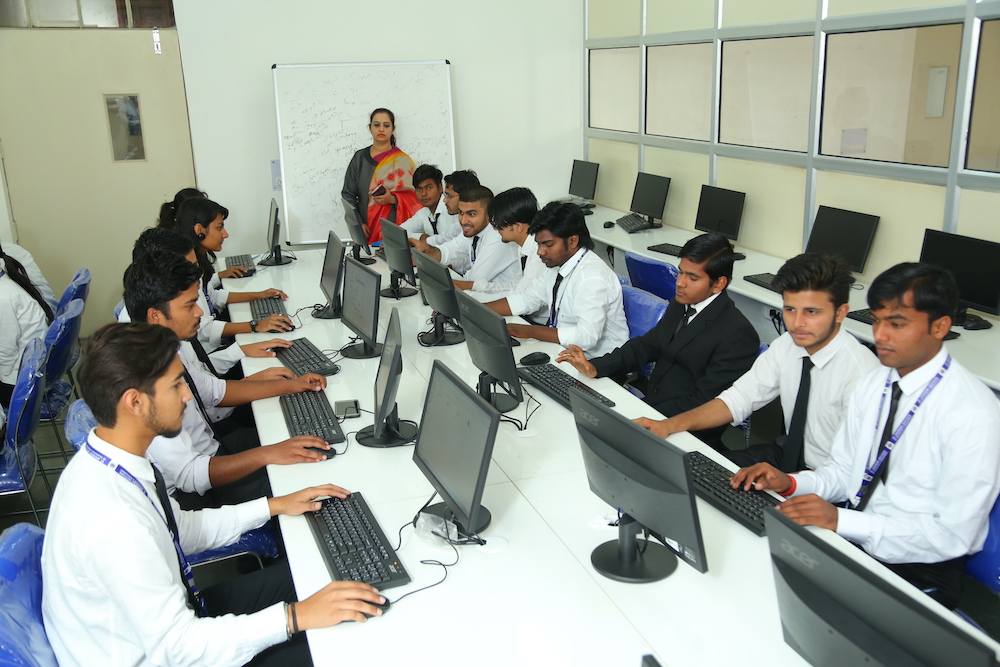
These programs often operate in an online mode, utilizing advanced learning management system (LMS) that offer live lectures, forums, chat rooms, and other interactive features to actively engage students.
Career Impact
An online MBA degree can significantly enhance career opportunities, providing graduates with the skills needed to advance to higher management roles or pivot to new industries.
Cost
The fees for online MBA courses can vary widely depending on the institution, ranging from a few lakh rupees to nearly ten lakhs for the entire course.
Some of the most opted courses in India and St. Andrews college or different Engineering college or Management colleges are as follows:-
- Btech
- Btech CSE
- Btech ETCE
- MTech
- BCA
- BBA
- MBA
- MCA
- DPharma – St. Andrews College of Pharmacy
- BPharma – St. Andrews College of Pharmacy
- BArch – St. Andrews College of Architecture
Eligibility Criteria for Online MBA Courses in India

The eligibility criteria for online MBA courses in India may vary slightly among different universities and programs. However, here are the general requirements that most institutions follow for online courses:
Educational Qualification:
Applicants must hold a bachelor’s degree from a recognized university.
The required minimum percentage in the bachelor’s degree typically ranges from 50% to 60%, although this can be lower for reserved categories.
Work Experience:
Some programs may require applicants to have work experience, particularly for executive MBA programs. The required experience can range from 2 to 5 years, depending on the program’s focus and level of seniority it aims to cater to.
For regular MBA programs, work experience is often preferred but not mandatory.
Entrance Exams:
Many institutions require scores from entrance exams such as the CAT (Common Admission Test). Some universities may also accept scores from exams like XAT (Xavier Aptitude Test) or CMAT (Common Management Admission Test).
Certain universities conduct their own entrance exams for admission to their online MBA degrees.
Language Proficiency:
Proficiency in English is typically required, as most online MBA courses in India are conducted in English. However, specific tests for English proficiency (like IELTS or TOEFL) are generally not required unless the applicant has completed their education in a non-English medium.
Age Limit:
Generally, there is no age limit for applying to online MBA degrees.
Technical Requirements:
Given that the course is conducted online, candidates must have access to a computer and a stable internet connection. Some programs may specify technical requirements for hardware and software for online classes.
Admission Process for Online MBA Courses
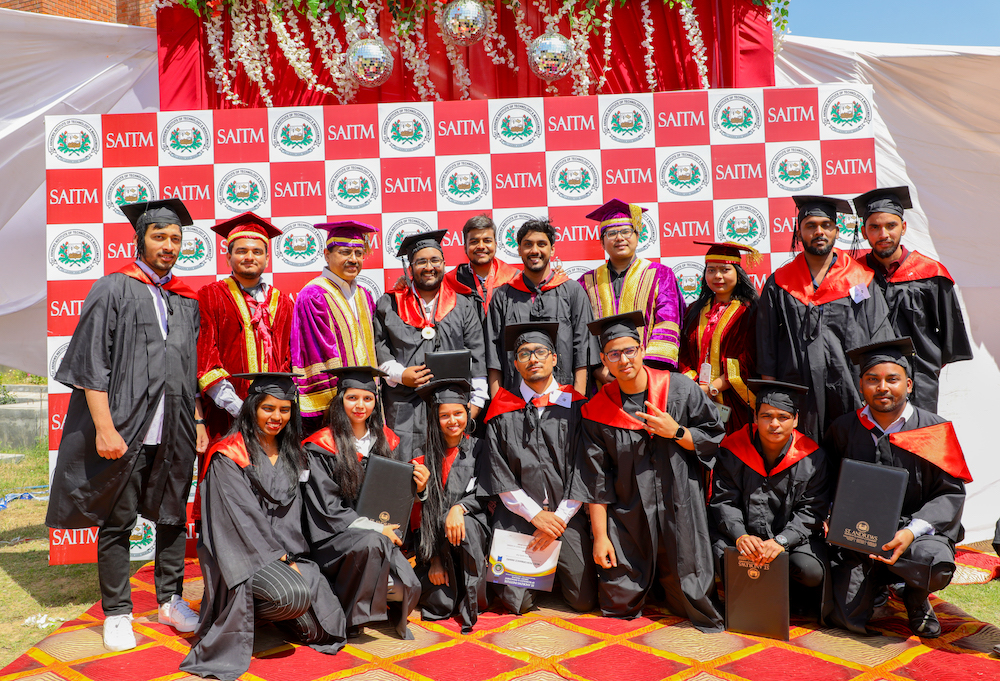
The admission process for online MBA courses in India generally involves several steps, which may vary slightly depending on the institution.
Here’s an overview of the common stages in the admission process:
Research and Selection:
Candidates interested in online learning should start by exploring various online MBA degrees to identify the one that aligns with their career aspirations and educational requirements. Key considerations should include specialization options, accreditation status, faculty qualifications, and tuition costs.
Meeting Eligibility Criteria:
Ensure you meet the basic eligibility criteria, such as having a bachelor’s degree with the required percentage, and, if applicable, relevant work experience and entrance exam scores.
Application Submission:
Applicants need to fill out an online application form available on the university’s website. This form typically asks for personal information, educational background, work experience, and details about entrance exam scores.
You will likely need to upload scanned copies of documents such as your graduation certificate, mark sheets, entrance exam scorecard, work experience certificates (if required), and photo ID.
Entrance Exam:
Some institutions may require scores from standardized tests like the CAT. Others might conduct their own entrance exams specifically designed for their online MBA courses.
Prepare and register for the required entrance exams well in advance.
Interview:

Some programs might require a mock interviews process, conducted either in-person or online, to evaluate a candidate’s fit for the program. This could involve discussions about your professional background, career aspirations, and motivations for pursuing an MBA in online courses.
Admission Offer and Acceptance:
After reviewing applications, entrance exam scores, and interview performances (if applicable), the institution will make admission offers to successful candidates.
Once you receive an offer, you will need to formally accept it and complete any required administrative procedures, such as paying the tuition fee or submitting additional documentation.
Orientation and Enrollment:
After accepting the offer, students are usually required to go through an orientation program, which introduces them to the online platform, course structure, and academic policies.
Top Online MBA Courses in India
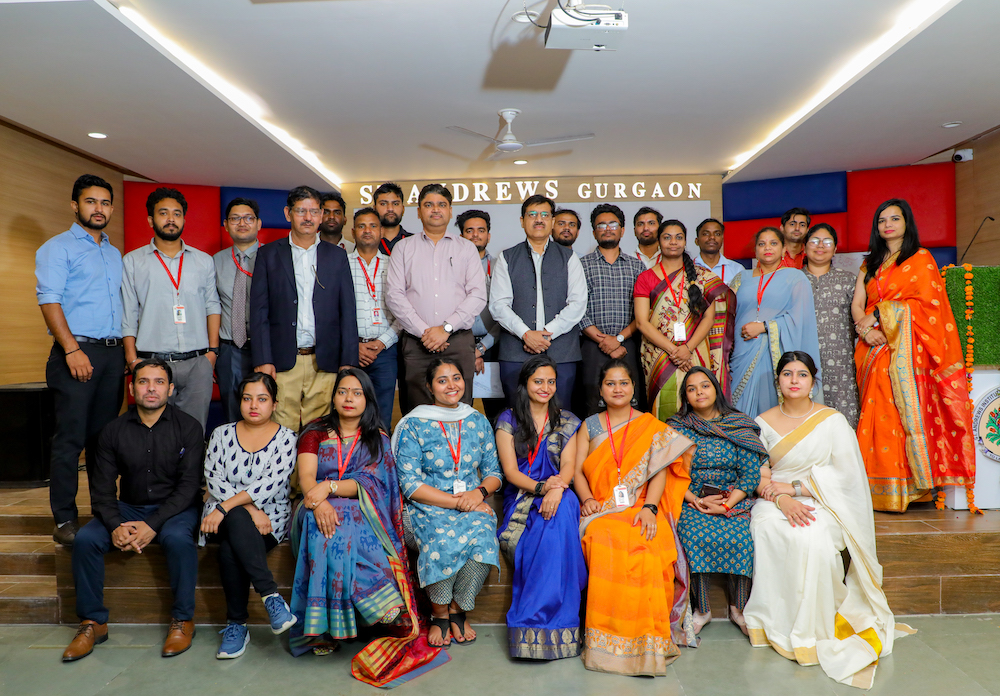
Online MBA courses in India have become increasingly popular due to their flexibility, affordability, and the ability to balance work and study. Here’s an overview of some of the top online MBA courses available in India, known for their quality, accreditation, and strong placement support:
1. Indira Gandhi National Open University (IGNOU)
Program: MBA
Duration: 2.5 to 8 years
Highlights: One of the most flexible and affordable programs with a wide range of specializations available. IGNOU is renowned for its extensive reach and comprehensive study materials.
2. St. Andrews Institute of Technology and Management, Gurgaon:
Program: MBA
Duration: 2 years
Highlights: Known for its case-based learning method which is highly effective for applying concepts to real-world business scenarios. Specializations include Marketing, Finance, HR, Business Analytics and IT .
3. University of Delhi
Program: MBA
Duration: 2 years
Highlights: Leveraging its broad faculty expertise, an online MBA could offer specializations in fields such as Finance, Marketing, Human Resources, Operations, and Strategy.
4. Dr. B.R. Ambedkar Open University (BRAOU)
Program: MBA
Duration: 3 years
Highlights: The MBA program offers specializations in key areas such as Marketing, Finance, Human Resource Management, and Hospital & Healthcare Management, catering to the diverse interests and career aspirations of students.
5. Anna University
Program: MBA
Duration: 2 years
Highlights: The program offers various specializations including Marketing, Finance, Human Resources, Systems, Operations, and Health Services Management. This allows students to tailor their education to their career goals and interests.
These online MBA degrees are designed to provide flexible learning options while maintaining high educational standards. They cater to the needs of both fresh graduates and working professionals looking to enhance their managerial skills and career prospects.
Fee Structure of Online MBA courses

The fee structure for online MBA courses in India can vary widely depending on the institution, the duration of the program, and the specific features offered. Generally, online MBA courses tend to be more cost-effective compared to traditional on-campus programs due to lower operational costs and the absence of expenses related to physical infrastructure.
Here’s an overview of the fees for some well-known online MBA courses in India:
1. Indira Gandhi National Open University (IGNOU):
Fees: The full course fee is approximately ₹31,500.
Duration: 2.5 to 8 years.
Highlights: IGNOU is known for its affordability and flexibility, making it a popular choice for students looking for a budget-friendly option.
2. St. Andrews Institute of Technology and Management, Gurgaon
Fees: Ranges from ₹ 2.6 lakhs for the entire program.
Duration: 2 years.
Highlights: SAITM offers a comprehensive MBA programme with several specializations(Marketing, Finance, Human Resources, IT, Business Analytics) and is known for its industry-aligned curriculum.
3. University of Delhi:
Fees: Approximately ₹ 50,000 for the entire program.
Duration: 2 years.
Highlights: Specializes in sector-specific MBAs such as Finance, Marketing, Human Resources, Operations, and Strategy, with a focus on industry-aligned skills.
4. Dr. B.R. Ambedkar Open University (BRAOU):
Fees: The full course fee is around ₹ 30,000.
Duration: 3 years.
Highlights: Offers an online MBA in Marketing, Finance, Human Resource Management, and Hospital & Healthcare Management, focusing on contemporary analytical skills.
Duration of Online MBA Course
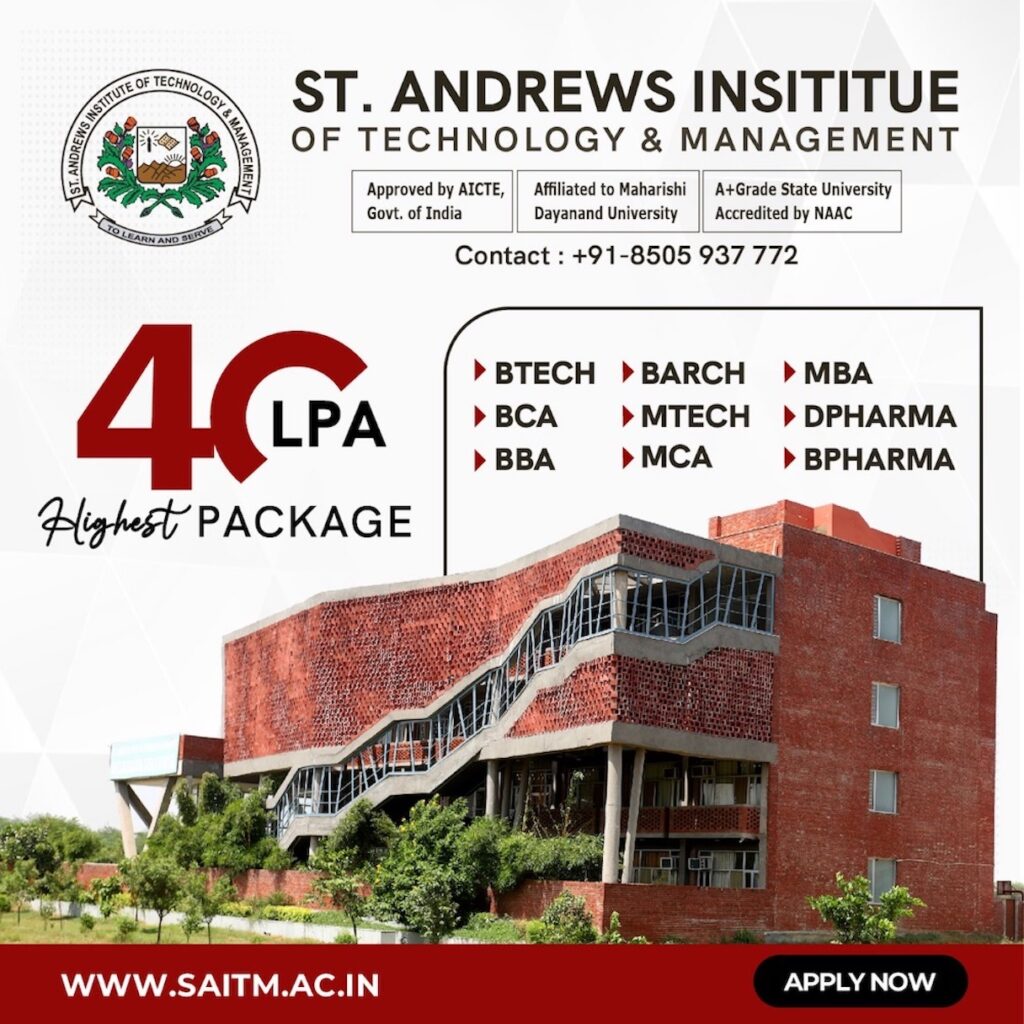
The duration of online MBA courses can vary depending on the institution and the program’s structure. Here are the typical duration ranges for online MBA degrees:
1. Standard Full-Time Online MBA
Duration: Typically 2 years.
Structure: This format usually mirrors the traditional full-time MBA program but is delivered online. It often requires a substantial weekly time commitment, involving regular interactions with faculty and peers through virtual platforms.
2. Accelerated Online MBA
Duration: Typically 12 to 18 months.
Structure: These programs are more intensive and require students to take more courses simultaneously or within shorter term lengths. They are designed for students who want to complete their MBA quickly and are prepared to dedicate more time per week to their studies.
3. Part-Time Online MBA
Duration: Typically 3 to 5 years.
Structure: This option is designed for working professionals who need to balance their studies with work and other responsibilities. The coursework is spread out over a longer period to reduce the weekly study time.
4. Executive Online MBA
Duration: Typically 1 to 2 years.
Structure: Tailored for senior professionals and executives with considerable work experience. The curriculum is often more focused on advanced strategic management and leadership skills.
5. Flexible Online MBA
Duration: Typically up to 5 years.
Structure: Some institutions offer flexible online MBA courses where students can choose how quickly or slowly to progress through the coursework, depending on their personal and professional commitments.
Key Points to Consider
Start and End Dates: Some online MBA programs have multiple start dates throughout the year (rolling admissions), which can affect the duration if there are breaks between courses.
Course Load: The number of courses you take each term can also affect how quickly you complete the program.
Internship or Capstone Projects: Some programs include a capstone project or an internship, which might extend the duration depending on the project scope or the time needed to complete the internship.
When choosing an online MBA program, consider your own scheduling needs and professional goals to select a program whose duration and structure best fit your life.
Syllabus for Online MBA Courses in India

The syllabus for online MBA courses in India can vary depending on the institution and the specific specialization chosen. However, most online MBA programs cover a core curriculum that equips students with a broad base of business management knowledge, followed by elective courses that allow for specialization in specific areas.
Here’s an overview of a typical syllabus for an online MBA program:
Core Courses

The core courses generally cover fundamental aspects of business management. These are designed to provide a solid foundation in key business disciplines.
Managerial Economics
Focuses on economic theories and practices that help in decision-making under uncertainty, including demand analysis, production and cost, market structures, and pricing strategies.
Financial Accounting
Teaches the basics of financial reporting, the balance sheet, income statements, cash flow analysis, and the fundamentals of accounting principles.
Quantitative Methods
Covers statistical techniques and methodologies for decision-making, including probability, regression analysis, hypothesis testing, and data interpretation.
Organizational Behavior
Explores human behaviour in organizational settings, the interface between human behaviour and the organization, and the organization itself.
Marketing Management
Introduces the concepts of marketing, including market analysis, consumer behaviour, marketing strategy, and the marketing mix.
Operations Management
Deals with the design and management of products, processes, services, and supply chains. It looks at the acquisition, development, and utilization of resources that firms need to deliver goods and services.
Corporate Finance
Focuses on financial theory and its application in the corporate setting, covering topics like capital budgeting, capital structure, corporate sources of funding, and financial risk management.
Human Resource Management
Covers the key aspects of managing people in organizations, including recruitment, training, performance management, and employee relations.
Business Communication
Teaches effective communication strategies and skills, including writing business reports, making presentations, and interpersonal communication.
Strategic Management
Focuses on the formulation and implementation of major goals and initiatives taken by a company’s top management on behalf of owners.
Elective Courses

Electives allow students to focus on specific areas of interest or to specialize in a particular field. These might include:
- Digital Marketing
- International Business
- Entrepreneurship
- Supply Chain Management
- Information Technology Management
- Healthcare Management
- Financial Analysis or Banking
- Project Management
Specializations:
Most online Business Administration MBA degrees feature specializations that enable students to focus on specific industries or sectors, such as international business management. Popular specializations include Finance, Marketing, Operations, HR, and Information Technology.
Capstone Projects
Many MBA courses culminate in a capstone project, where students apply what they have learned to real-world business challenges. These projects often involve working with a company to solve a specific problem or to provide strategic recommendations.
Practical Components
Online Business Administration MBA degrees frequently incorporate practical elements like simulations, case studies, group projects, and occasionally internships. These components are intended to bridge the gap between theoretical knowledge and practical application.
Advantages of Online MBA Courses

Online master’s courses in business administration have gained popularity due to their distinct advantages, particularly beneficial for working professionals and individuals facing logistical challenges. Here are some key benefits of pursuing an online master in business administration:
1. Flexibility
Scheduling: Digital MBA courses offer significant flexibility regarding when and where you can engage in your studies. This is particularly advantageous for working professionals who can study after hours or during weekends without disrupting their regular work schedule.
Pace: Many online degrees allow students to take courses at their own pace, accelerating or decelerating their study schedule as needed.
2. Accessibility
Geographic Independence: Students can access quality education from anywhere in the world without the need to relocate or commute to a campus. This opens opportunities for students to enroll in top programs without geographic limitations.
Technological Integration: With courses designed for online delivery, these programs often utilize advanced educational technology, providing interactive and engaging learning experiences through virtual classrooms, online simulations, and more.
3. Cost-Effectiveness
Lower Total Cost: Digital MBA programs generally cost less than traditional on-campus programs due to lower tuition fees and the elimination of commuting costs and some student fees.
No Lost Income: Since you can work while studying, there’s no need to forfeit a salary to pursue education full-time.
4. Work-Life Balance
Maintaining a balance between personal, professional, and academic life is more manageable with an online MBA because of the flexibility to integrate study with other responsibilities.
5. Diverse Networking Opportunities
Global Connections: Online MBA cohorts often include students from across the globe, offering opportunities to network with a diverse group of professionals.
Broadened Perspectives: Interaction with international peers provides insights into global business practices, broadening your understanding of various business environments.
6. Career Advancement
Immediate Application: The skills learned can be applied immediately to your current job, allowing for real-time career growth and development.
Enhanced Credibility: Obtaining an MBA can enhance your professional credibility and make you a more competitive candidate for promotions and new job opportunities.
7. Personalized Learning Environment
Customizable Learning: Many online degrees offer a wide range of electives and specialization options, allowing students to tailor their education to their specific career goals and interests.
Interactive Technologies: Utilization of forums, webinars, and group projects facilitates a collaborative and interactive learning environment, even remotely.
8. Technological Proficiency
Tech Skills: Navigating through online learning platforms can enhance your technical skills, which are valuable in the increasingly digital workplace.
9. Quality of Education
Accredited Programs: Many digital MBA courses are provided by accredited institutions and uphold the same rigorous curriculum and high-quality standards as their on-campus equivalents.
Experienced Faculty: Online students often learn from the same faculty as on-campus students, ensuring that the quality of instruction is not compromised.
10. Self-Discipline and Time Management
Improved Self-Motivation: Online learning requires a high degree of self-discipline and time management skills, qualities that are highly valued in the business world.
Online MBA Specialisations

Online MBA degrees offer a variety of specializations catering to different areas of interest and career paths. These specializations allow students to tailor their education to specific sectors or management domains. Here’s a look at some popular online MBA specializations available in India:
1. Finance
Focus Areas: Investment analysis, corporate finance, international finance, risk management.
Career Opportunities: Financial analyst, financial manager, investment banker, treasurer.
2. Marketing
Focus Areas: Digital marketing, consumer behavior, sales management, brand management.
Career Opportunities: Marketing manager, brand manager, sales manager, market research analyst.
3. Human Resource Management (HRM)
Focus Areas: Recruitment, training and development, employee relations, compensation and benefits.
Career Opportunities: HR manager, talent acquisition specialist, training and development manager, HR consultant.
4. Operations Management
Focus Areas: Supply chain management, logistics, project management, quality control.
Career Opportunities: Operations manager, project manager, supply chain analyst, production manager.
5. Information Technology (IT) Management
Focus Areas: IT project management, information security, data management, systems analysis.
Career Opportunities: IT manager, systems manager, data processing manager, IT project manager.
6. Healthcare Management
Focus Areas: Healthcare administration, health services management, patient care services, medical practice management.
Career Opportunities: Healthcare administrator, hospital manager, health services manager, clinical manager.
7. Entrepreneurship
Focus Areas: New venture creation, small business management, innovation management, startup dynamics.
Career Opportunities: Entrepreneur, business owner, startup advisor, venture capital analyst.
8. International Business
Focus Areas: Global marketing, international trade laws, cross-cultural management, international finance.
Career Opportunities: International business manager, trade manager, international marketer, business development manager.
9. Supply Chain Management
Focus Areas: Logistics, procurement, transportation management, supply chain strategy.
Career Opportunities: Supply chain manager, logistics manager, procurement manager, inventory manager.
10. Business Analytics
Focus Areas: Data analytics, predictive analytics, decision analysis, business intelligence.
Career Opportunities: Business analyst, data analyst, analytics manager, business intelligence analyst.
11. Sustainability and Environmental Management
Focus Areas: Sustainable business practices, environmental regulation, corporate social responsibility, green business management.
Career Opportunities: Sustainability officer, environmental manager, CSR manager, compliance officer.
12. Risk Management
Focus Areas: Enterprise risk, financial risk, operational risk, compliance.
Career Opportunities: Risk manager, compliance officer, risk analyst, insurance manager.
13. Digital Marketing
Focus Areas: Social media marketing, search engine optimization, content marketing, email marketing.
Career Opportunities: Digital marketing manager, SEO specialist, content marketing manager, social media manager.
14. Consulting
Focus Areas: Management consulting, strategy consulting, IT consulting, HR consulting.
Career Opportunities: Management consultant, business consultant, strategy consultant, IT consultant.
Future Scope after Online MBA Degree Program

The future scope after completing an online MBA degree program is quite promising, offering diverse career opportunities and the potential for significant professional growth. The flexibility, specialized knowledge, and managerial skills acquired through an online MBA can open up various paths across multiple sectors. Here’s an overview of what the future might hold after you earn an online MBA (Master of Business Administration):
1. Career Advancement
Higher Positions: Graduates often climb the corporate ladder more quickly, reaching mid-level management, senior management, or executive positions.
Increased Responsibilities: You might take on roles with greater responsibilities, managing larger teams or more significant projects.
2. Career Transition
New Industries: An MBA can provide the leverage needed to switch industries, such as moving from technical roles to management roles or from specialized sectors to more general managerial roles.
New Functions: It can also facilitate a move to different functions within the same industry, such as from operations to strategic roles or from sales to corporate finance.
3. Entrepreneurship
Start Own Business: Many MBA graduates are inspired to launch their own ventures. The skills learned during the MBA—such as business planning, strategic thinking, and leadership—are invaluable when starting and running a business.
Innovative Ventures: The entrepreneurial skills can also help in pioneering innovative business models or introducing new products and services to the market.
4. Consulting
Management Consulting: With a broad understanding of business practices and strategic thinking, MBA graduates are well-suited for consulting roles that require analyzing business problems and suggesting improvements.
Specialized Consulting: Depending on the MBA specialization, you can enter fields like financial consulting, HR consulting, IT consulting, or operations consulting.
5. Global Opportunities
International Careers: The global exposure and multinational networking opportunities provided by most MBA programs can pave the way for international career opportunities.
Cross-cultural Management Roles: Understanding global business environments can lead to roles in multinational companies where cross-cultural management skills are essential.
6. Higher Salary Potential
Increased Earnings: Post-MBA salaries are typically higher than those of peers without an MBA. The degree often leads to higher starting salaries and greater earnings growth over time.
7. Continuous Learning and Development
Further Education: An MBA can also serve as a platform for further academic pursuits, such as doctoral studies in business or related fields.
Professional Development: The habit of continuous learning developed during the MBA can encourage ongoing professional development through courses, workshops, and certifications.
8. Networking
Alumni Networks: MBA programs provide access to extensive alumni networks that can offer support, resources, and opportunities throughout your career.
Professional Connections: The connections made with peers, faculty, and industry professionals can be instrumental in personal and professional growth.
9. Corporate Leadership
C-Suite Roles: Long-term career paths can lead to C-suite roles such as CEO, CFO, COO, or CMO, where an MBA’s strategic and leadership training is directly applicable.
Board Positions: MBA graduates are also candidates for board of directors’ positions, contributing to governance and strategic direction.
10. Sector-Specific Roles
Depending on your specialization, you could pursue roles specifically in finance, healthcare, technology, manufacturing, or nonprofit management, where specialized knowledge and skills are highly valued.
Job Profiles After Online MBA Course
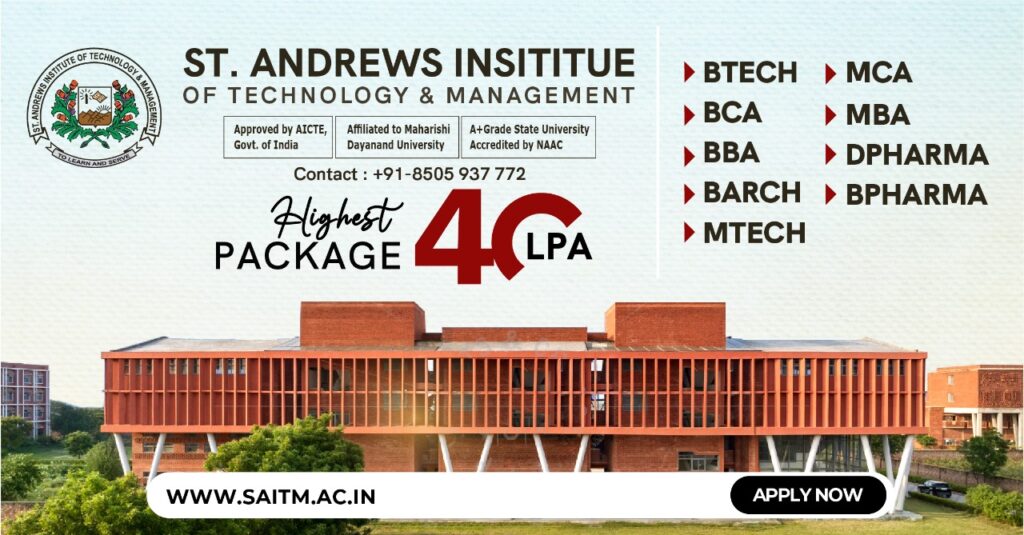
An online MBA can equip you with versatile skills and a broad knowledge base, making you suitable for a variety of job roles across different industries.
Here are some common job profiles that graduates of online MBA courses often pursue:
1. Management Consultant
Role: Helps organizations improve their performance by solving problems and finding new and better ways of doing things. It’s not industry-specific, and consultants may work in areas such as management, strategy, IT, finance, marketing, HR, or supply chain.
Industries: Consulting firms, independent consulting, corporate strategy departments.
2. Financial Analyst/Manager
Role: Analyzes financial data and trends to assist businesses with decision-making about their financial strategies. This role often involves budgeting, forecasting, and managing investment activities.
Industries: Finance, banking, corporate sectors, government agencies.
3. Marketing Manager
Role: Oversees the marketing activities of an organization, develops marketing strategies, and manages marketing campaigns to promote products and services.
Industries: Any sector that offers goods or services, including technology, healthcare, consumer goods, and media.
4. Operations Manager
Role: Ensures efficient production and delivery of products. This role involves managing the day-to-day operations of a company, including logistics, supply chain management, and production planning.
Industries: Manufacturing, retail, logistics, and supply chain sectors.
5. Human Resources Manager
Role: Manages all aspects of HR practices and processes. This includes recruitment, selection, salary setting, training, promotions, compliance with regulatory concerns, and employee relations.
Industries: All industries.
6. Project Manager
Role: Responsible for planning, executing, and closing projects. This includes managing teams, resources, budgets, and timelines.
Industries: IT, construction, engineering, healthcare, and any project-based business.
7. Business Development Manager
Role: Drives the growth of the business by identifying new business opportunities, developing new relationships, and negotiating and closing business deals.
Industries: Technology, media, telecommunications, financial services, and many others.
8. Entrepreneur/Startup Founder
Role: Starts and manages a new business venture. This involves planning, hiring, marketing, and managing all aspects of the business.
Industries: Varied, depending on the nature of the business.
9. Product Manager
Role: Acts as a bridge between engineering, design, and marketing teams to guide a product from conception to launch.
Industries: Mainly in technology companies but also in consumer goods and services.
10. Chief Technology Officer (CTO)
Role: Oversees the development and correct deployment of technology within an organization.
Industries: Technology companies, but increasingly seen in non-tech companies that rely heavily on technology.
11. Supply Chain Manager
Role: Manages the entire supply chain from procurement to production to distribution.
Industries: Manufacturing, retail, consumer goods, and any company involved in large-scale production and distribution.
12. Healthcare Administrator
Role: Manages operations in healthcare settings, ensuring the facility runs efficiently while also complying with healthcare laws, regulations, and technology standards.
Industries: Hospitals, clinics, public health departments, and other healthcare facilities.
Top Colleges in India for Online MBA Program

India is home to many leading colleges and universities that offer reputable online master’s degree programs in business administration. These programs are designed to provide flexibility while maintaining academic rigor, making them suitable for working professionals who wish to advance their careers without pausing their jobs.
Here are some of the top institutions in India known for their online MBA courses:
IGNOU (Indira Gandhi National Open University)
IGNOU is one of the largest and most respected open universities in the world, known for its comprehensive distance learning programs. It offers a wide range of specializations in its online MBA program, such as Human Resource Management, Financial Management, Operations Management, Marketing Management, and Financial Markets Practice.
St. Andrews Institute of Technology and Management (SAITM), Gurgaon
St. Andrews Institute of Technology and Management (SAITM) in Gurgaon is known for its robust MBA program, which emphasizes practical knowledge, industry exposure, and overall development of managerial skills.
Dr. B.R. Ambedkar Open University (BRAOU)
Located in Hyderabad, BRAOU offers an MBA through distance learning that is well-suited for working professionals. It provides a flexible learning environment with a focus on practical business skills.
Uttar Pradesh Rajarshi Tandon Open University (UPRTOU)
This university offers an online MBA with a variety of specializations. The program is designed to cater to the educational needs of working professionals and entrepreneurs.
Alagappa University
Based in Tamil Nadu, Alagappa University offers an online MBA program through its Directorate of Distance Education. The program is well-regarded for its quality and diverse specializations.
Karnataka State Open University (KSOU)
KSOU offers an online MBA program that aims to develop competent business professionals. It is recognized for its flexible admission criteria and comprehensive curriculum.
Madhya Pradesh Bhoj (Open) University
This university provides an online MBA program designed to offer deep insights into various aspects of management. It is known for its affordable tuition and practical approach to education.
FAQs
Which is the best online MBA in India?
The “best” online MBA in India can vary based on individual needs and preferences, such as specialization, flexibility, faculty expertise, and cost. However, the Indira Gandhi National Open University (IGNOU) and University of Delhi are highly regarded for their comprehensive online MBA degrees.
IGNOU is celebrated for its affordability and flexibility, making it a popular choice for many students, while NMIMS is recognized for its strong academic rigor and a variety of specializations that cater to different professional interests.
Both institutions have robust distance learning infrastructures, ensuring a quality educational experience.
Is online MBA course valid in India?
Yes, online MBA courses are valid in India if they are offered by accredited institutions and recognized by the University Grants Commission (UGC) or the All India Council for Technical Education (AICTE). These courses are widely accepted in both the public and private sectors for employment and further education.
What is the cost of online MBA in India?
The program fee for an online MBA in India can vary significantly, typically ranging from around ₹50,000 to ₹5,00,000. This variance depends on factors such as the institution and the program’s specific features. For instance, IGNOU provides more economical options, whereas universities like NMIMS tend to charge at the higher end of this spectrum.
Is online MBA (Master of Business Administration) better?
Whether an online MBA ( Master of Business Administration) is better depends on your individual circumstances and goals. Here are some factors to consider:
Advantages of an Online MBA:
- Flexibility: It’s ideal for working professionals who need to balance their studies with work and personal commitments.
- Accessibility: Students can access programs from prestigious institutions without needing to relocate.
- Cost-Effectiveness: Typically, online MBAs are less expensive than their on-campus counterparts.
Potential Drawbacks:
- Networking Opportunities: While online programs offer networking, they might not provide the same depth of personal interaction as on-campus programs.
- Perception: Some employers may still prefer a traditional MBA, although this is rapidly changing as more top schools offer online options.
What is the MBA Program?
An MBA programme, or Master of Business Administration, is a graduate-level degree that provides theoretical and practical training to help individuals develop a broad understanding of business management functions.
The MBA program typically covers various areas such as finance, marketing, operations, and HR, aimed at enhancing leadership and managerial skills.
This program is popular among those seeking to advance their careers, change professions, or improve their understanding and expertise in business management.
Can I get an MBA degree online?
Yes, you can obtain an MBA degree online. Many accredited universities around the world offer online MBA programs that provide the same curriculum as their on-campus counterparts, allowing students to complete their degree remotely while managing other personal or professional responsibilities.
Is online MBA (Master of Business Administration) valid?
Yes, an online MBA (Master of Business Administration) is valid, especially when obtained from an accredited institution recognized by relevant educational authorities.
These degrees are generally respected by employers and are considered equivalent to traditional, on-campus MBA degrees, provided they meet the accreditation standards.
Is an online MBA degree worth it?
An online MBA programme can be worth it if it aligns with your career goals and learning style.
Here are some factors that can make an online MBA valuable:
Flexibility: It allows you to balance work, life, and studies, which is ideal for working professionals.
Cost-Effectiveness: Generally, online MBAs are less expensive than traditional programs.
Career Advancement: It can open doors to higher positions, increase earning potential, and improve professional skills.
Access to Top Schools: You can enroll in programs offered by prestigious institutions worldwide without relocating.
What is the cost of an online MBA?
The cost of an online MBA (Master of Business Administration) can vary widely depending on the institution and the specific program features.
Generally, in India, the fees can range from about ₹50,000 to ₹5,00,000. Globally, costs can range from a few thousand dollars to over $100,000 for programs at top-tier business schools.
Factors influencing the cost include the reputation of the institution, the duration of the program, and additional resources offered to online students.
Will the online MBA be recognized while applying for jobs?
Yes, an online MBA (Master of Business Administration) will generally be recognized while applying for jobs, especially if it’s from an accredited institution. Many employers now acknowledge the legitimacy and relevance of online education.
It’s crucial to ensure that the online education program is accredited by a recognized body, as this assures employers of the quality and rigor of the education provided. However, it’s advisable to research how specific industries and companies view online MBAs, as perceptions can vary.
What is the maximum duration of online degree programs?
The maximum duration of online degree programs can vary significantly depending on the institution and the specific program’s structure. For online MBA courses, for instance, many institutions offer flexible timelines to accommodate working professionals.
Typically, these programs can be completed within 2 to 5 years, but some schools may allow up to 8 years for completion, especially for students who need to balance their studies with other significant commitments like work or family.
When considering a program offered in online mode, it’s crucial to check its specific requirements and guidelines, as they can vary significantly.
What is virtual placement drives?
Virtual placement drives are events organized by educational institutions or companies in online mode to facilitate the recruitment process for students or job seekers. These drives are conducted using virtual platforms and digital tools to connect recruiters with potential candidates efficiently.
They typically include various activities such as job postings, resume submissions, online assessments, interviews, and job offers, all conducted virtually.
Virtual placement drives offer convenience and accessibility for both recruiters and candidates, including online MBA students, enabling them to participate from anywhere with an internet connection without the need for physical presence.
What specializations are available in Amity university online MBA program?
Amity University, as one of the leading higher education institutions, offers a range of specializations in its online MBA course, including Digital Marketing, Data Science, Business Analytics, and International Finance. These options allow students to customize their education to align closely with their career aspirations.
Are online MBA degrees recognized by employers?
Online MBA degrees that are approved by the University Grants Commission (UGC) are recognized and valued by employers, similar to traditional MBA degrees, especially if they are from reputed institutions.





